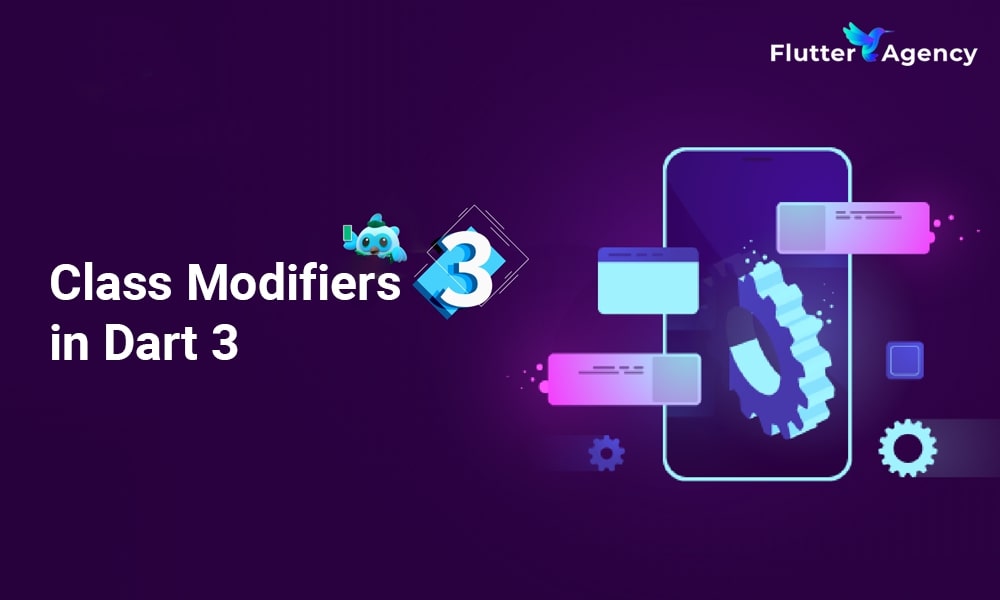Class Modifiers in Dart 3 Explained with Example
Dart is a programming language that is free to use for the development of projects. However, it delivers excellent flexibility and power to its team of developers. Class modifiers in Dart 3 has many new specifications and features, like records, patterns, and class modifiers.
This article will cover the latest class modifiers, adding value to the Dart or Flutter developer.
What are class modifiers?
If you have worked before with a Dart programming language, then you have a clear idea about declaring the classes directly with the class keyword, like:
class MyClassA {}
Else, declare an abstract class to define the interface in Dart with an abstract keyword and then integrate it with the implements, just like:
abstract class MyClassB {}
class MyClassC implements MyClassB {}
Also, integrating a non-abstract class in your Dart application will give an error at compile time. It is displayed to contain all the member definitions of the class you claim to integrate.
Let’s see an example of an abstract class that would be integrated into the other classes:
Example of an abstract class
abstract class AbstractClassA {
abstractMethod();
}
class MyFirstClass implements AbstractClassA {} // Error.
class MySecondClass implements AbstractClassA {} // Error.
You must have an idea why this error occurs, right? If not, then the reason for this is that a class that implements an abstract class should define all its members:
abstract class AbstractClassA {
abstractMethod();
}
class MyFirstClass implements AbstractClassA {
@override
abstractMethod() => "randome text";
} // Ok.
class MySecondClass implements AbstractClassA {
@override
abstractMethod() => "randome text";
} // Ok.
Otherwise, imagine if we were required to identify another abstract method in AbstractClassA:
abstract class AbstractClassA {
abstractMethod();
anotherAbstractMethod();
}
Now compile an error that will be thrown in the code, informing us that MyFirstClass and MySecondClass must define the new method.
It is a highly complex issue when working on Dart or Flutter package apps. Anyone can implement your class on its own and use it. A newly declared abstract method in AbstractClassA will usually require a breaking change in the code to implement and will also definitely be defined.
In that scenario, Flutter experts rely on informing their package users through documentation and also commenting on the documentation.
New class modifiers in Dart 3
An earlier example was one of the significant reasons for similar problems when developing, extending, and integrating the class into other codes.
Also, new class modifiers come into play, and we will explain each one with an example use case.
The final class modifiers in Dart 3
A new final class modifier that can be declared like:
final class FinalClass {}
It allows the FinalClass to be built and will prevent all the other options like integrating it, extending it, or using the mixin class. Let’s see an example below:
// All following lines will throw an error; a final class can only be constructed
class Class1 extends FinalClass {}
class Class2 implements FinalClass {}
class Class3 with FinalClass {}
mixin Mixin on FinalClass {}
enum Enum implments FinalClass {}
Simultaneously throw a compile error just by informing you that FinalClass is a final class, and because of that, it is intended only to be developed:
var myFinalClass = FinalClass(); // OK, we can do this only.
It is useful when you have a class that you wish to use only within your Flutter library or package so that no one else can simply build upon it or reflect from it, as it will prevent all of that.

The interface class modifiers in Dart 3
To showcase the interface class modifier, declare the two dart libraries, i.e., lib_a and lib_b.
Inside lib_b, we will develop the simple new class B:
library lib_b;
class B {
void doSomething() {
print('Doing something');
}
}
Now, we have a library that consists of just one class, which is B, and we are marking that class with a new interface class modifier:
library lib_b;
interface class B {
void doSomething() {
print('Doing something');
}
}
It permits class B to be used within the library (lib_b) without restrictions.
library lib_b;
interface class B {
void doSomething() {
print('Doing something');
}
}
class BB extends B {
@override
void doSomething() {
print('Doing something else');
}
}
It will work like that; you are in the same library and didn’t find any difference as a developer. But if we import the lib_b library inside another library that is lib_a, it tries to extend the B class, which is prevented. As this interface permits a class to be implemented but not extended:
library lib_a;
import 'lib_b.dart';
// Error, we can't extend the B class since it is an interface.
class A extends B {
@override
void doSomething() {
print('Doing something else');
}
}
// Ok, the B is marked with interface, and so we can implement it normally outside it's library.
class AA implements B {
@override
void doSomething() {
print('Doing something else');
}
}
An interface class modifier will prevent extending a class from outside the class. In this way, you can work on the package APIs and methods securely, guaranteeing that everyone can integrate that class, but no one can extend the same functionality.
The base class modifier
Taking the same libraries lib_b and lib_a notations, new base class modifiers can be declared like this:
library lib_b;
class B {
void doSomething() {
print('Got it.');
}
}
We declared the simple B class internal to the lib_b library and are now marking it with the new base class modifier:
library lib_b;
base class B {
void doSomething() {
print('Got it.');
}
}
It grants only the B class to be extended but not integrated; in that case, a base class will reverse the interface.
library lib_a;
import 'lib_b.dart';
// Error, we can't implement a base class externally.
base class ClassA implements B {
@override
void doSomething() {
print('Got it from ClassA.');
}
}
// OK, a base class (BaseClassB) can be extended by another class (AnotherClassA)
base class AnotherClassA extends B {
@override
void doSomething() {
print('Got it from ClassA.');
}
}
Hence, implementing the base class is prevented; it will throw a compile time error, and you can only extend it.
Mixin class modifier
Before introducing the mixin class modifier in the earlier version of Dart, coders could declare classes that are used as mixins, like:
class MixinClass {}
class AnotherClass with MixinClass {} // previously, this was OK.
Usually, classes can be used as mixins into other classes directly, but this creates confusion as Dart already has the mixin feature separately.
To use the class as a mixin in Dart 3, mark it with the mixin class modifier keyword; otherwise, it will just throw a compile-time error.
class MixinClass {}
class AnotherClass with MixinClass {} // Error, classes that are not marked with mixin class modifier can't be used as mixins anymore.
Hence, to resolve this issue, you just need to command the compiler, as this class is intended to be used as a mixin.
mixin class MixinClass {}
class AnotherClass with MixinClass {} // Ok, this now is good with Dart 3.
Multiple class modifiers
The new class modifiers explained above can be merged with another Dart abstract class modifier, as they intend to prevent the construction of the class.
For instance, we want to declare a class that can be constructed and extended only if the base class modifiers are used.
base class ClassA {}
If you make a class that allows you to be extended and integrated but is prevented from being constructed, then the answer will be an abstract class modifier.
abstract class ClassB {}
If we merge the base and abstract modifiers, then the result will look like this:
abstract base class OnlyExtendableClass {}
Similarly, you can combine the class modifiers to achieve the particular behaviour of classes matching your use case.
Conclusion
Dart 3 has developed unique and exciting features to support its developers in developing and delivering reliable apps. Hence, the new class modifiers are intended to prevent significant problems and enforce consistency while working with or contributing to an ecosystem of Dart and Flutter.
I hope you guys have enjoyed the article and that it has clarified the confusion of Dart 3 class modifiers with the help of an example. To develop this functionality in your Flutter app development with Dart version 3, you must hire Flutter app experts to make feature-rich apps with rich features and functionalities. Let us connect with us and share your requirements.
Frequently Asked Questions (FAQs)
1. What are modifiers in Dart programming?
Class modifiers control how the class or mixin can be used, both from its own library and from outside of the library where it is defined. Also, modifier keywords come into the role before the class or main declaration.
2. What is new in Dart 3?
Dart 3 has declared new and updated features, like patterns and records, that enhance switch and if-case statements.
3. Differentiate between class and abstract class
An abstract class is similar to the interface that defines the class and cannot be implemented. Abstract classes will keep the code safe and honest. It also assures that all the integration subclasses will define all the properties and methods of an abstract class, but it leaves the integration to each subclass.
Contemporary ventures
Recent blog
ready to get started?
Fill out the form below and we will be in touch soon!
"*" indicates required fields













